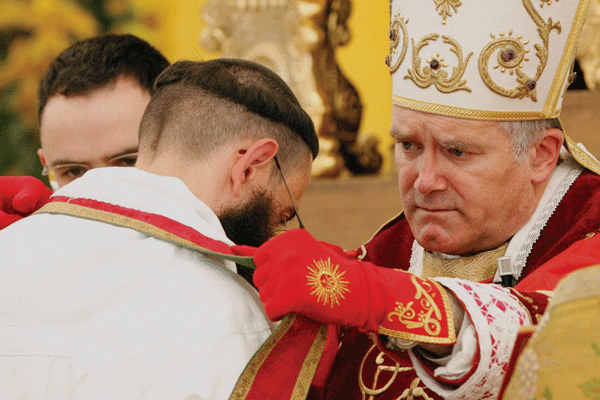ROME — In what amounts to a category-bending gesture, Pope Francis, often seen as a progressive pontiff indifferent to the concerns of more traditionalist Catholics, reportedly has vowed to extend his recognition of the confessions heard by priests of a breakaway traditionalist group indefinitely.
Last September, Francis surprised many by extending an olive branch to the breakaway traditionalist group known as the Society of Pius X (SSPX) by decreeing that during his Holy Year of Mercy anyone who confesses their sins to a priest of the society will be considered validly forgiven.
Bishop Bernard Fellay, superior general of the society, said on Sunday as he was celebrating Mass for a group of pilgrims assembled in France that during a recent private conversation, Francis had confided that he wanted to extend this authorization.
According to the French blog Le Salon Beige, the first news outlet to report Fellay’s comments, in his homily the bishop also shared that Francis had said he’d never condemn the society, and that in his eyes, they were “part of the Church”.
The Vatican hasn’t released a statement confirming the report, but last week, through a one-sentence statement, they did confirm the private meeting between Francis and Fellay, which took place on April 1 at the pope’s personal residence in the Vatican.
At the time, the information provided by the society, also known as the “Lefebvrists” after their founder, the late French Archbishop Marcel Lefebvre, said that the canonical status of the society hadn’t been directly addressed by Fellay and the pope, with both having determined that the exchanges have to continue “without haste.”
An audio of Fellay’s homily, in French, was made available on Monday by the website of the society, which is called Dici. In the 30-minute recording, Fellay also speaks of Francis’ recent apostolic exhortation on the family, Amoris Laetitia.
The bishop says the document “makes us cry,” adding that its stance on access to the Sacraments for divorced and civilly remarried couples makes this a “terrible document which harms the Church.”
In the April 10 homily, Fellay expressed “happiness” over his encounter with Francis.
“You are Catholics, you’re not excommunicated, and we must continue to work towards full communion,” is what the bishop claims the pope told him.
The Society of St. Pius X was founded by Lefebvre in 1970, in the wake of the reforming Second Vatican Council. It’s been in rupture with Rome since 1989, when the late archbishop ordained four new bishops without papal approval.
The four were excommunicated, and remained so until 2009, when, in an attempt to bring the society fully back into the fold of the Church, Pope Benedict XVI lifted the excommunications.
One of those prelates was British Bishop Richard Williamson, who only days before the emeritus pope’s decision was made public gave an interview to Swedish television in which he appeared to deny the Holocaust.
“I believe that the historical evidence is hugely against six million Jews having been deliberately gassed in gas chambers as a deliberate policy of Adolf Hitler,” Williamson said in the interview.
At the time the excommunication was lifted, Williamson was living in Francis’ backyard, in Buenos Aires, Argentina. When he founded the society, Lefebvre envisioned Argentina as the stronghold of the SSPX in Latin America and actually founded a seminary there, which is still active.
Last year Cardinal Mario Poli, handpicked by Francis as his successor in Buenos Aires, helped the society earn recognition as a juridical person, which meant it was added to the “Register of the Institutes of Consecrated Life” in which the Catholic orders and religious congregations present in Argentina are listed.
In Argentina, Catholic religious congregations have to be listed in the register to be able to work within a government-recognized juridical framework.
Talks between the Vatican and the SSPX have been ongoing since 2000, so far with no success.
One of the things presently being discussed is the society’s canonical status. When writing about the meeting between Francis and Fellay, Matteo Matzuzzi, the Vatican expert of the Italian daily Il Foglio, said that the option presently under consideration is assigning the society status as a “personal prelature.”
That’s a relatively new category in Church law, and at the moment it’s only applied to Opus Dei.
In a nutshell, personal prelatures include a prelate and clergy who undertake specific pastoral activities in various regions or among different social groups. In addition, they’re not defined by geographical terms, but rather by their mission. Lay people can dedicate themselves to the work of a prelature.
The priests and bishops who belong to a prelature answer to the prelate, who in turn answers directly to the pope.
In 2012 the Vatican had made an offer to the society to be recognized as a prelature, but it was rejected.
The canonical status of the society, however, is not the only issue being discussed.
In a recent interview with French newspaper La Croix and translated into English by the blog Rorate Caeli, Archbishop Guido Pozzo, an official of the Vatican office heading talks with the Lefebvrists, listed the issues that need to be discussed and clarified before reinstatement is possible.
Among the topics listed there’s the fact that many members of the society reject the documents of Vatican II, as well as inter-Christian dialogue [ecumenism] and dialogue with non-Christian religions.
“But they are not an obstacle for the canonical and legal recognition of the SSPX,” said Pozzo, Secretary of the Pontifical Commission “Ecclesia Dei,” which was established under St. John Paul II in 1988 to care for traditionalist Catholics who did not wish to go into a formal break with Rome.
















